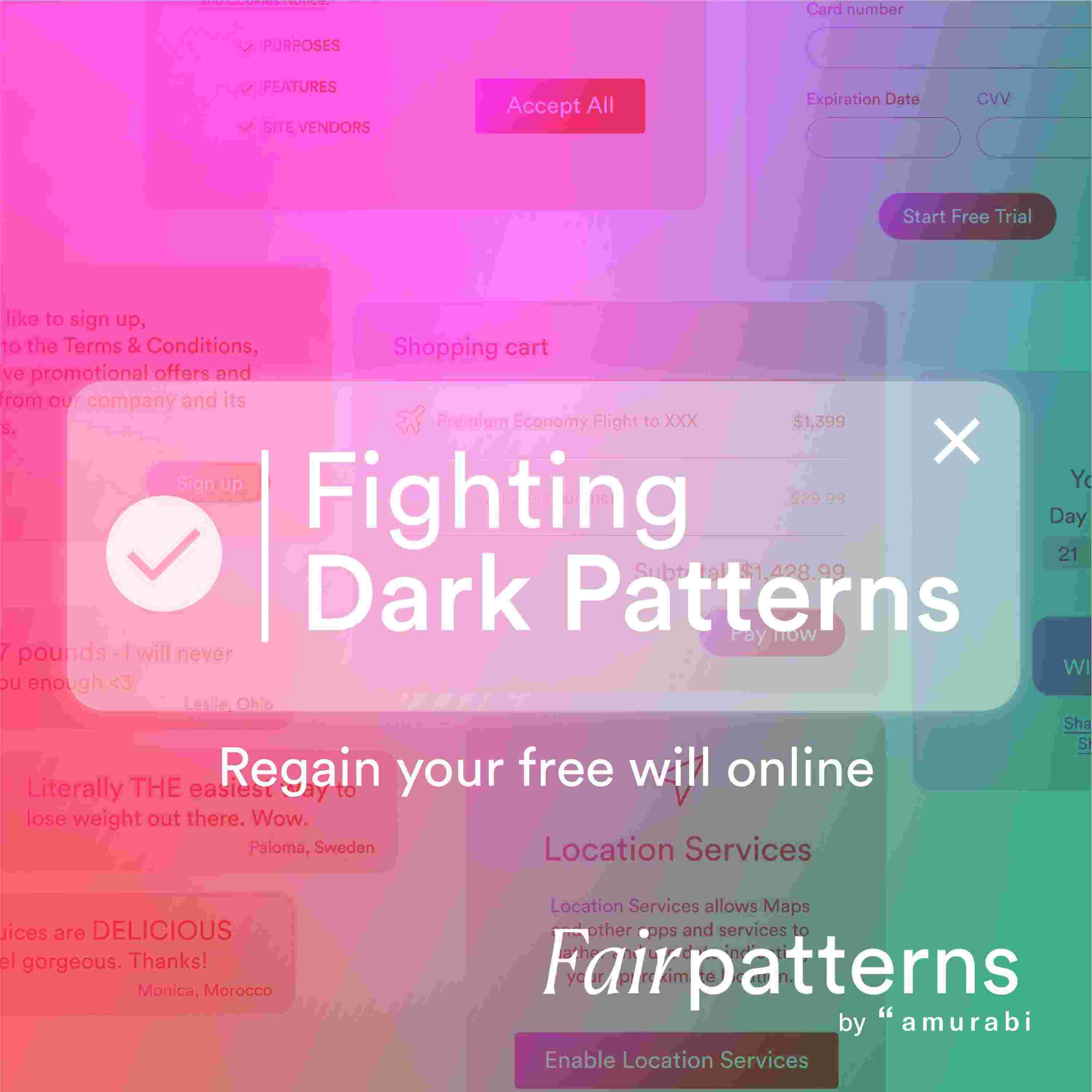
Have you ever struggled to resist sites or apps which prompt you to share ever more personal data? Who hasn’t casually clicked on the big green “I agree” button, instead of the little grey links below? And who doesn’t lose their patience unsubscribing from a website, when all it took was one click to “try for free”?
These features are called “dark patterns” or “deceptive patterns”, which are interfaces that deceive or manipulate users to make them act without realizing or against their own interests.
Why should we care about it ? Because …
✅ dark patterns harm the autonomy, the welfare and the privacy of individuals, and are psychologically detrimental
✅ a number of laws already prohibit dark patterns, and the global legislative framework is shifting towards clarity, transparency, accessibility and fairness by design
✅ dark patterns affect competition and trust in brands, and even puts our democratic models at risk
And because eventually, there is nothing sustainable about tricking users.
Dark patterns are pretty much everywhere online and yet, it’s not inevitable to be deceived or manipulated. With this podcast, once a month, Marie Potel, founder of the legal design agency Amurabi and of the platform fairpattern.com explore with her guests all the aspects of this dark and broad matter : regulation, ethics, marketing, user experience and much more.
A question or a need for support ? Go on fairpatterns.com or contact Marie Potel on LinkedIn !
This podcast is proposed and presented by Marie Potel, produced by Amicus Radio and directed by Leobardo Arango.
Original Music : Alexis Mallet.
Hébergé par Acast. Visitez acast.com/privacy pour plus d'informations.
Have you ever struggled to resist sites or apps which prompt you to share ever more personal data? Who hasn’t casually clicked on the big green “I agree” button, instead of the little grey links below? And who doesn’t lose their patience unsubscribing from a website, when all it took was one click to “try for free”?
These features are called “dark patterns” or “deceptive patterns”, which are interfaces that deceive or manipulate users to make them act without realizing or against their own interests.
Why should we care about it ? Because …
✅ dark patterns harm the autonomy, the welfare and the privacy of individuals, and are psychologically detrimental
✅ a number of laws already prohibit dark patterns, and the global legislative framework is shifting towards clarity, transparency, accessibility and fairness by design
✅ dark patterns affect competition and trust in brands, and even puts our democratic models at risk
And because eventually, there is nothing sustainable about tricking users.
Dark patterns are pretty much everywhere online and yet, it’s not inevitable to be deceived or manipulated. With this podcast, once a month, Marie Potel, founder of the legal design agency Amurabi and of the platform fairpattern.com explore with her guests all the aspects of this dark and broad matter : regulation, ethics, marketing, user experience and much more.
A question or a need for support ? Go on fairpatterns.com or contact Marie Potel on LinkedIn !
This podcast is proposed and presented by Marie Potel, produced by Amicus Radio and directed by Leobardo Arango.
Original Music : Alexis Mallet.
Hébergé par Acast. Visitez acast.com/privacy pour plus d'informations.

In this episode of Fair Patterns: Regain Your Freedom Online, we welcome Chandni Gupta, Deputy CEO and Digital Policy Director at the Consumer Policy Research Centre (CPRC), Australia’s leading consumer policy think tank. Chandni shares insights from CPRC’s 2022 report, Duped by Design, which revealed that 83% of Australians have experienced negative consequences from dark patterns—deceptive online designs that manipulate users.
We discuss how dark patterns not only lead to financial losses but also affect privacy, mental well-being, and consumer trust. Chandni highlights the legal gaps in Australia, where 8 out of 10 dark patterns remain legal, and contrasts this with stronger protections in the U.S. and Europe.
Chandni also emphasizes the role of businesses in improving the online experience by rethinking design practices to build trust. Finally, she shares insights from her Churchill Fellowship, which focuses on finding global solutions to protect consumers from digital harm.
For more insights, check out Chandni’s research and fellowship:
Subscribe to CPRC’s newsletter at cprc.org.au, and don’t forget to subscribe to Fairpatterns' newsletter: Unlock the Trust.
Hébergé par Acast. Visitez acast.com/privacy pour plus d'informations.